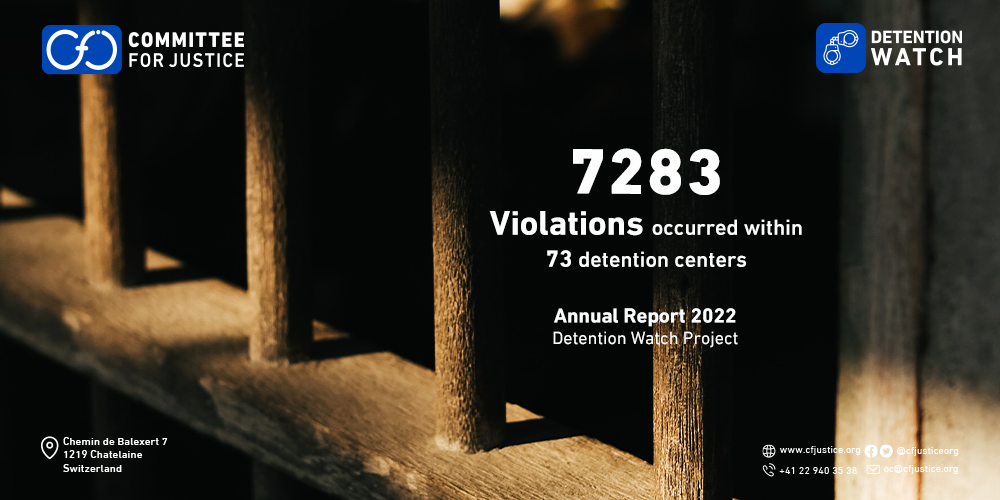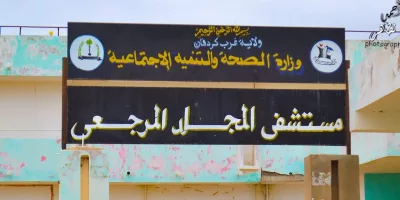The Committee for Justice (CFJ) stated in its annual report for 2022 that it was a year filled with contradictions by the political authority in Egypt between its declared speeches and horrifying practices against opponents and citizens in general.
The report, part of CFJ’s Detention Justice project that documents violations inside Egyptian prisons and detention centers, concluded that speculations about an improvement in the Egyptian human rights scene were proven to be nothing more than a propaganda campaign targeting only foreign observers. The security agencies continued their campaigns against citizens, not adhering to what the authorities claimed as steps to improve the human rights situation in Egypt.
These factors, in addition to external pressure, prompted the authorities to invite their opponents back to the political scene in a Ramadan Iftar event entitled Egyptian Family Iftar, under the auspices of the Egyptian President, Abdel Fattah el-Sisi, attended by a number of political figures, including Hamdeen Sabahi, Khaled Dawood, and others. This move was reported by media sources to be aimed at seeking support from opponents to take a political action that reassures the people towards the current economic situation. During the Egyptian Family Iftar, Sisi announced a number of political and economic decisions, including the reactivation of the Presidential Pardon Committee, which was formed as one of the outputs of the National Youth Conference. However, despite that, the numbers of those released or those who were released on bail did not increase significantly, and security pursuits and arbitrary detention of citizens did not stop.
Judicial decisions and legislative amendments:
The report also clarified that last year witnessed judicial decisions and legislative amendments, including the Justice Minister’s decision to transfer “terrorism” trials to the Badr Prison Complex, which made things difficult for the families of the accused and lawyers, who have complained about what they described as “inhumane and humiliating conditions” that they are forced to face while carrying out their work in a city that is more than 68 kilometers away from Cairo, and that it is not equipped to receive trials.
On the legal level, the report stated that the Egyptian Parliament issued many controversial legislations in 2022, including the approval of draft law 14/2022, submitted by the government, to amend the prison regulation law. But the amendments were formal and terminological amendments that did not meet human rights standards in dealing with gross violations inside
detention facilities in Egypt. The report also pointed to Resolution No. 371/2022, issued by the the Ministry of Interior, to include the headquarters of the General Intelligence Agency in the New Administrative Capital among the places legally authorized to detain suspects in cases that affect national and state security, a measure that risks more violations such as enforced disappearance, torture and arbitrary deprivation of liberty.
Unjust verdicts and executions:
CFJ documented the issuing of several verdicts in various cases in 2022, including death sentences, life imprisonment, rigorous imprisonment, and jail terms.
Among the most notable verdicts were death sentences against 10 defendants in the Helwan Brigades case. The State Security Emergency Court also issued nine life sentences and three rigorous imprisonment sentences in the case known as “Daesh El Agouza,” 43 life sentences and 87 rigorous imprisonment sentences. Additionally, the First Terrorism Circuit of the Criminal Court punished 17 defendants in the case known as “Cabinet Building Events” with imprisonment ranging from 7 to 15 years and ordered them to pay 17,622,000 Egyptian pounds for the damages caused. One defendant received 15 years of rigorous imprisonment, and 16 defendants were sentenced to 7 years of rigorous imprisonment. On January 3rd, the military ruler approved the verdict against activist Alaa Abdel Fattah and human rights lawyer Mohamed El-Baqer.
Regarding the execution of death sentences, four convicted defendants in the case known as “Helwan Microbus” (No. 9115/2016) and three defendants in the case known as “Ajnad Misr First” (No. 3455/2014) were executed during the year. The latter case saw the defendants subjected to several violations following their arrest, including enforced disappearance, physical and psychological coercion to give confessions, and interrogation without lawyers present.
Documenting 7,283 violations:
CFJ was also able to document 7,283 violations that occurred inside 73 detention centers, whether official or unofficial, distributed among 19 Egyptian governorates and varied between multiple types of violations. The majority of violations were related to arbitrary deprivation of liberty, accounting for about 90% of the documented violations, with 6,612 violations documented, followed by enforced disappearances with 373 violations, then 201 violations related to poor detention conditions, followed by 49 and 48 violations related to torture and deaths inside detention centers, respectively.
The report stated that the violations, especially those related to arbitrary deprivation of liberty, were concentrated in certain months, including October and November, during which calls for protests against the economic situation began and were met with random and arbitrary arrests, searching citizens’ phones, and detaining some for hours in police stations.
The report also pointed out that in terms of the governorates where violations occurred in 2022, which were 19 Egyptian governorates, Cairo topped the list with approximately 65% of the total documented violations (4,762 out of 7,283). This can be attributed to Cairo’s geographic location as the capital where the largest number of the republic’s population resides. The next governorate on the list was Sharqia, where approximately 27% of the documented violations occurred, with 1,992 violations.
In terms of detention center types, police stations and centers topped the list of locations where violations occurred, with about 66% of the documented violations (981 out of 1,468). This was followed by central and public prisons and penitentiaries with approximately 29% of the total violations, with 430 documented violations, then 30 violations in the occasional detention facilities, followed by the Central Security Forces camps with 25 violations, and finally two violations in the National Security headquarters.
The report also verified violations against 50 victims from approximately 30 places of detention, including prisons, police stations, and National Security headquarters. Patterns of the verified violations included arbitrary arrest due to opinion and profession, mass arrests of members of the same family, in addition to crimes of enforced disappearance, torture and ill-treatment inside detention facilities, and deliberate denial of health care.
The report stated that CFJ’s UN communication team submitted 76 complaints and correspondences in 2022 regarding victims of human rights violations in Egypt to many UN bodies and teams, including the Working Group on Arbitrary Detention, the Group on Enforced Disappearance and the Special Rapporteurs on the situation of human rights defenders, extrajudicial killings and the protection and promotion of human rights while countering terrorism; and the Special Rapporteur on Freedom of Opinion and Expression, as well as compiled correspondence with other partners on the circumstances of the Cop27 Climate Summit in Sharm El-Sheikh, in November 2022.
Recommendations of the report:
In conclusion, the report recommended that President Sisi issue a general amnesty for judgments issued against peaceful opposition and state opponents, with a decision to impose a moratorium on the implementation of the death penalty. It also recommended defining the tasks and powers of the Presidential Pardon Committee, putting an end to the crackdown on citizens, arbitrary and prolonged pre-trial detention, along with issuing a decision to include those convicted and victims of prolonged pre-trial detention and enforced disappearances in pension and social security programs.
CFJ also recommended that the Egyptian Ministry of Interior review the situation of all detainees and the facilities in which they are detained, with emphasis on stopping the crackdown on the opposition and human rights defenders, and ending enforced disappearances. It also called for investigations into citizens’ complaints and reports of human rights violations and holding those responsible from within the ministry accountable.
As for the judiciary, CFJ called for a serious investigation into the cases of torture documented in the report. It also called for serious and transparent investigations into the incident of the death of the economist Ayman Hodhod, and holding those responsible for his enforced disappearance and torture accountable. Additionally, it called for reopening the investigation into the Salam Police Station case, canceling the unfair judgment, and stopping the trial of civilians in a military court.
The institution also called on the Egyptian judiciary to activate alternatives to prolonged pretrial detention, while reviewing the decision of the Minister of Justice to transfer the trials of the accused to the Badr Courts Complex because of its serious effects on the violation of the rights of defense. CFJ also called on the Economic Court to stop issuing judgments against citizens on charges related to publishing, opinion, and infringement of the values of the Egyptian family.
CFJ also demanded the legislative authorities in Egypt to pay attention to the actual reform of Egyptian prison institutions and not just to change the terminology, with a review of the law regulating the work of NGOs that restricts the work of civil society members, as well as a review of the laws issued during the reporting period that expanded the application of freedom-depriving punishments instead of rehabilitation and reform.






